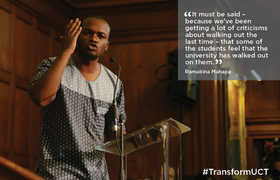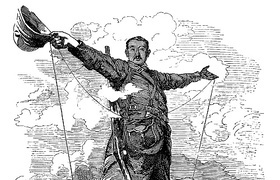HAICU and young artists propose less harmful masculinities
26 August 2013UCT's Molly Blackburn Hall was alive with music, dancing and a unique art exhibition on 15 August. The occasion marked the university's HIV/AIDS Institutional Co-ordination Unit (HAICU) third-term campaign, done in collaboration with fine art students and academics around the topic of how ideas of masculinity interact with the HIV/AIDS pandemic in South African society.
Two beds - with red threads subtly woven into the duvet covers, to represent the barely visible impact of HIV when looking from the 'outside in' - competed for attention with bedazzled business cards and a former soldier's case (carried with him on the battlefield) that was filled not with bullets, but with a bouquet of flowers.
"The message is pretty simple," said popular DJ Ryan O'Connor, the master of ceremonies. "The role that males play in society needs to change. We as men and women need to change it. We need to start looking at our lovers as equals, start looking at other people in our communities as equals.
"People think HIV is in townships and in gay clubs. It's not. It's here, next to you." Fabian Saptouw, the UCT fine art lecturer in charge of the groups of first-year students who designed the artworks as part of their curriculum, said weaving messages about socially relevant issues into students' coursework was a useful way to "get [students] engaged, to get them thinking about it, and how it affects them in their daily lives".
While he was "impressed with the whole group", Saptouw was particularly taken by the way the soldier's case had been subverted to represent an alternative idea of masculinity.
"The artwork with the flowers coming out of the army case is particularly potent, because you have the flowers in this thing that you wouldn't obviously associate with flowers and beauty," said Saptouw. "You're thinking about a particular kind of masculinity in the army: violence, war, drills, that kind of thing. It's that kind of machismo, and they're using these fragile, delicate flowers, and you're really thinking about how fragile masculinity is on a social level, and all the facades that men have to put up."
Lucina Reddy, a HAICU project officer, said the theme of challenging normative ideas of masculinity spoke closely to the unit's work on combating the spread and harm caused by sexually-transmitted diseases on campus, including HIV and the cervical cancer-causing Human Papilloma Virus (HPV).
"Professor Rachel Jewkes of the Medical Research Council recently showed the link between increased levels of HIV and intimate partner violence," said Reddy. "Women who had partners who were violent are more likely to have HIV.
"We also need to talk to the gentlemen of this campus and say that gentlemen are carriers of HPV without realising it. There's no screening test for men, so the only time men present [with HPV] is generally when they have a genital wart, so we needed to educate students about these things," said Reddy. "At this very moment our peer educators are rolling out gender, health and HPV workshops across our campuses.
"[Female] students can get the HPV vaccine through Student Wellness, but they have to pay for it. We have a changing student population, so we have to think about what it means for our students that are on Financial Aid, and about reproductive health rights for young women. So that's something that HAICU are interested in understanding, namely: (a) do women know about the vaccine? (b) are they able to access the treatment?"
Story by Yusuf Omar
 This work is licensed under a Creative Commons Attribution-NoDerivatives 4.0 International License.
This work is licensed under a Creative Commons Attribution-NoDerivatives 4.0 International License.
Please view the republishing articles page for more information.









